2017-2018学年牛津译林版初中英语8A Unit 8 Grammar 课件
新牛津译林版八年级上8A Unit1-8语法总结

新牛津译林版八年级上8A Unit1-8语法总结形容词和副词都有三个等级,即原级、比较级和最高级。
比较级用于两者之间的比较,表示“更……”,而最高级用于三者或三者以上之间的比较,表示“最……”。
比较级前面通常会加much、even或a little修饰,其中even和much只能修饰比较级。
常见的修饰语包括still、even、any、quite(a bit)、almost、nearly、just、rather、a little、a bit、much、a lot、far、many、twice、ten times、one fourth、two pounds和three years。
形容词的比较级和最高级的构成有规则变化和不规则变化。
规则变化包括直接加、去e加、双写加、变y加以及more/most。
不规则变化则是指一些常见的形容词,如good/well、bad/ill、many/much、little、far、old以及XXX等。
形容词的比较等级还有一些常见的句型,如“A=BA+ V + as + adj./adv。
+ as + B”(与……一样)、“A≠ BA + V + not +as/so + adj./adv。
+ as + B”(与……不一样)以及“A。
B或A <B,A + V +比较级+ than + B”(比……更……)。
这些句型可以帮助我们更好地理解和运用形容词的比较等级。
XXX.XXX。
we can use the structure A + V + twice/four times/。
+ as + adj./adv。
+ as + B。
For example。
"This room is twice as large as that one" means that the entire room is twice the size of the other room。
Unit8Grammar课件牛津译林版八年级英语上册

预习导学
二、选一选
when, while, as
1.Timmy was sleeping when the earthquake started.
2.People were running in all directions while pieces of
glass and bricks were falling down.
研读概念,观察形式并总结
1.认真研读第97页过去进行时的概念,观察句子中的动词 形式,指出什么时候用was,什么时候用were。
合作探究
2.总结:在过去进行时态中,当主语是第一或第三人称单 数时,助动词用was;当主语是you或复数时,助动词用were。 其否定句是在was/were后加not,一般疑问句是把was/were提到 句首。肯定回答是:Yes, 主语 + was/were. 否定回答是:No, 主语+wasn’t/weren’t.
3. As Timmy was trying to find his way out, he suddenly
heard some noise above him.
预习导学
4.Millie was watching TV when Andy came into the room. 5. While the boys were playing football, the bell rang.
合作探究
完成练习,核对答案 1.学习单词及短语break, break down。完成A部分的练习, 并核对答案。 2.四位学生分角色朗读对话内容,巩固过去进行时态的用 法。 3.阅读课本第98页B部分的内容,了解并记住when, while 和as的用法。 4.完成B部分的练习,并核对答案。
牛津英语新译林版8A Unit8 词组归纳

8A Unit 8 词组归纳Class_____ Name________1.我的屋子都湿了。
My house is all wet.(wet-wet ter-wet test)2.把水都擦干mop all the water up, mop it up,mop up the floor (mop ped-mop ping)3.输掉决赛lose the final (lost)4.难道你没听见下雨吗?Didn’t you hear the rain?5.成千上万的人死于地震中。
The earthquake killed thousands of people.6.三人死于车祸。
The car accident killed 3 men.=Three men lost their lives in the car accident.7.撞到一棵树上crash into a tree (crashed)8.冲走村庄wash the village away (washed)9.闪电引起一场大火Lightning starts a big fire.=Lightning causes a big fire.10.一幢楼被雷电击中而着火了。
Lighting hit a building and it caught fire. (be on fire)11.从树上坠落且伤了他的腿fall from a tree and hurt his legs (fall-fell; hurt-hurt)12.有人受伤吗?Was anybody hurt?13.弄清楚某人怎么了find out what happened to sb.14.自然灾害natural disasters15.狂风暴雨雷电交加a heavy storm with thunder and lightning16.听到像雷声一样的巨响hear a loud noise like thunder (heard)17.感到一丝轻微的晃动feel a slight shake18.开始震动start to shake (shake-shook)19.惊恐地尖叫scream in fear20.尽力从楼房里跑出去try one’s best to run out of the building (tried)21.当玻璃碎片和砖掉下时人们四处奔逃。
Unit 8 Grammar语法形容词和不定代词的用法 七年级英语下册练习(牛津译林版)(解析版)

Unit 8 Grammar语法形容词和不定代词的用法七年级英语下册练习Grammar本课重点在课程结束时,学生应该能够:1. 用形容词来形容人或事物;2. 了解不定代词的用法。
本课难点 1. 学习如何使用形容词。
2. 学习如何使用不定代词。
常考句型 1.Goldfish are easy to look after.2.There isn’t anybody in the room.一、单项选择1.As a child. I would sit for hours by the river doing_____-simply daydreaming A.nothing B.everything C.something D.anything 2.—Mom, there isn't ________ to eat at home.—I know. Your dad is in the living room. Ask ________ to buy some bread and fruit. A.anything; her B.anything; him C.everything; her D.everything; him3.—It’s convenient to travel from Baoding to Beijing by taking the newly-built green railway.—Yes. It’s said that ________ is enough.A.fifteen minutes drive B.fifteen-minutes driveC.fifteen minute’s drive D.fifteen minutes’ drive4.This is an ________question. So I think you can find its answer ________. A.easily; easily B.easy; easy C.easily; easy D.easy; easily 5.Chinese people are very ________.A.friend B.friendsC.friendly D.unfriendly6.It’s ________ to swim in the pool.A.relax B.relaxes C.relaxed D.relaxing 7.The ice-cream tastes _________ , but it’s bad _________ health.A.well; for B.good; for C.well; with D.good; with 8.— How far is this shopping mall from your school?— ________.A.It is a 10 minutes’ ride B.It takes 10 minutes’ rideC.It is a 10-minute ride D.It is 10 minutes’ on bike9.Jane is ________ girl and she is in Grade 1.A.a 8-years-old B.an 8-years-old C.a 8-year-old D.an 8-year-old 10.There is ________ with the computer. It doesn’t work.A.nothing wrong B.anything wrong C.wrong D.something wrong11.I like the movie very much because it’s very _________ .A.interesting B.interested C.boring D.bored 12.My grandfather eats ________ food, so he is in good ________.A.health; health B.healthy; healthyC.health; healthy D.healthy; health13.________ you learn ________ when you were in the countryside?A.Did; something B.Do; anything C.Did; anything D.Do; something 14.Ann is an ________ girl. She is from ________.A.England; English B.Chinese; China C.American; America D.good; England 15.He is________ to buy ________for his parents.A.rich enough;enough presentB.enough rich;enough presentsC.rich enough;enough presentsD.enough rich;presents enough16.Did you do during the last summer vacation?A.something special B.special something C.anything special D.special anything17.Tim is a ________ boy and he studies ________ at school.A.good; well B.good; good C.well; well D.nice; good 18.His are very to us. We all like them.A.friendly; friendly B.friends; friendlyC.friend; friendly D.friendly; friends19.—Is the juice ________?—Yes,you don't need to pay for it.A.free B.healthy C.delicious D.cold 20.—Do you have ________else to say for your mistake?—________but sorry.A.anything; Something B.something; Everything C.anything; Nothing D.something; Anything21.She is a young woman with ______.A.long hair B.long hairs C.a few long hair D.hair long 22.The star can bring good ________ to the little ________ girl.A.luck; luckily B.luck; lucky C.lucky; luck D.unlucky; lucky 23.The boy is ________ to carry________.A.old enough, enough books B.enough old, books enoughC.old enough, books enough D.enough old, enough books 24.—What's your favorite subject?—It's math. I think it's ________ and I can learn it well ________.A.easy; easily B.easy; easy C.easily; easily D.easily; easy 25.The boy is ____________, and he is always in good ____________.A.healthy; healthy B.health; health C.healthy; health D.health; healthy 26.This piece of music sounds ________ and girls are dancing ________ to the music. A.beautifully; beautifully B.beautifully; beautiful C.beautiful; beautifully D.beautiful; beautiful27.There will be ________ tomorrow, so it will be ________.A.rain; rain B.rainy; rainyC.rain; rainy D.rainy; rain28.—Was it ________ in your area yesterday?—No. But it ________ heavily today.A.snowed; snowy B.snowy; snows C.snowy; snowy D.snowy; snowed 29.—There isn’t ________ in today’s newspaper.—You don’t need to read it.A.something interesting B.interesting anythingC.interesting something D.anything interesting30.Mr Wind became ________ because he couldn't get the man's coat off. A.disappointed B.disappoint C.disappointing D.sadly 31.—Does it often ________ here?—Yes, it is quite ________.A.rain; rain B.rainy; rainy C.rain; rainy D.rainy; rain 32.My ________ sister is 3 years ________ than me.A.older, older B.older, elder C.elder, elder D.elder, older 33.—Is there ________ in today’s newspaper?—No, there’s ________ .A.something new; nothing new B.anything new; nothing newC.new something; new nothing D.new anything; new nothing34.—I think ______ study at school every day is much too long for the ______ students .—I think so.A.14 hour's ;13-years-old B.a 14-hours ;13-year-oldC.14 hours' ;13-year-old D.14-hour ;13-years-old35.Learn to smile. A smile costs_________, but gives so much.A.nobody B.nothing C.anything D.everything 36.Jim and Bob are my good . They are very to me.A.friend; friendly B.friend; friend C.friends; friendly D.friends; friend 37.It’s ten o’clock. The book shop _______ now. It usually ______ at nine in the evening. A.closes; closesB.is closed; closesC.is closing; is closedD.closes; is closed38.Don’t be ________ in class. Be ________, please.A.noise; quiet B.noisy; quietly C.noisy; quiet D.noise; quietly 39.My mother cooked ________ for us.A.something special B.special something C.anything special D.special anything40.There is _________ in today’s newspaper. I think you will be interested in it. A.anything interesting B.interesting anything C.something interesting D.interesting something41.I can’t help you now. Ask ________to help you.A.somebody else B.else somebodyC.somebody other D.other somebody42.I love ________ food: pizza and spaghetti. They are ________.A.Italy; awful B.Italian; awful C.Italian; delicious D.Spanish; delicious43.—How old is your sister?—She is ________girl.A.a eight —year—old B.an eight years oldC.a eight year old D.an eight—year—old44.—What kind of books do you like?—I like funny storybooks. They're very_.A.boring B.lazy C.quiet D.interesting 45.English is ______ . I like it.A.boring B.difficult C.interesting D.bad 46.Those toys for children look _______ and sell _______.A.good; lovely B.lovely; good C.well; lovely D.lovely; well 47.—Do these elephants live in _______?—Yes. The _______ people like them very much.A.African; Africa B.Africa; Africa C.Africa; African D.African; African48.—Do you know who ________ the glass?—Sorry, I don’t know. By the way, who is the owner of the ________ glass?A.broke; broke B.broke; broken C.broken; broken D.broken; broke 49.Tom! You're no longer a 3-year-old kid. I can cook dinner for you, but don't expect me to do _____ for you. Go and tidy your room!A.everything B.something C.anything D.nothing 50.I’m feeling so hot. I’d like to drink.A.something cold B.cold something C.something hot D.hot something 51.There are so many people talking and laughing here. It's really ________.A.quiet B.noisy C.lucky D.quick 52.This math question is ________ and I can answer it ________.A.easy, easily B.easily, easily C.easy, easy D.easily, easy 53.Who is staying at home now? ________, all of them are out.A.None B.No one C.Everyone D.Nothing 54.Kitty goes running to keep _______ every day, because she thinks running is good for her _______.A.health; health B.healthy; health C.health; healthy D.healthy; healthy55.—Do you have _____ for these clips?—Yes, I think they are _____ for me to buy.A.enough money; cheap enough B.money enough; enough cheap C.enough money; enough cheap D.money enough; cheap enough 56.The ________ woman is afraid of ________.A.death; dying B.dead; die C.dying; death D.died; dying 57.There isn’t__________in the room.It’s empty.A.something B.anything C.nothing D.everything 58.It’s ________. The buses and cars can’t run fast.A.foggy B.cloudy C.windy D.rain 59.She looks________. She always looks________at us.A.gladly, happy B.happily, gladC.sadly, gladly D.friendly, happily60.The fish smells ________ . I hope you ________ it.A.good; to enjoy B.well; will enjoyC.well; to enjoy D.great; will enjoy参考答案:1.A【解析】句意:作为一个孩子,我可以坐在河边好几个小时,什么也不做——只是做着白日梦。
Unit 8 Grammar-八年级英语上册(牛津译林版)

B: When/What time were you doing your homework at home?
C: Where were you doing your homework from 7:00 to 10:30 last night?
Presentation
Circle the right verb in the past continuous tense.
the simple past tense
Rule: When a short action happened at the same time as a long action, we can use “__w__h_e_n__” before the short action.
Presentation
You _w__e_re__re_a_d_i_n_g_
We _w_e_r_e_w_a_t_c_h_in_g_ TV
when the telephone rang. at ten last night.
They _w__e_re__p_la_y_i_n_g_ football I _w__a_s_w_a_s_h_i_n_g_ my car
特殊疑问句结构:特殊疑问词+ was/were+主语+ doing+其他?
I was doing my homework from 7:00 to 10:30 last night at home.
A
B
C
A: What were you doing from 7:00 to 10:30 last night at home?
the long action the past continuous tense
牛津译林版英语八上Unit 8《Natural》(Grammar)公开课课件

Exercise
What were you doing at 7 o’clock last night?
I was doing some housework.
I was having dinner.
What were you doing between 7 o’clock and 9 o’clock yesterday? I was doing my homework.
He was playing computer games.
What were they doing How about them? at that time last week?
They were shopping.
They were having a picnic.
以上我们已经通过归纳总结和练习 对本课的语法内容有了一定的了解, 下面就让我们根据 之前练习的考察情 况进一步选择讲解
with ‘while’ , ‘when’ and ‘as’
Words and expression review break vi. 损坏;打破
break down 出故障;坏掉 because of 由于;因为
Look at the following sentences carefully. Pay attention to the colored parts.
Grammar
Objectives
To learn to use the past continuous tense to talk about things that were happening for some time in the past
To learn to use past continuous tense
牛津译林版八年级英语上册 Unit8_Grammar随堂练习

Unit8 Grammar随堂练习一、汉译英1. 一场可怕的暴风雪_________________2. 公共汽车站_________________3. 在公路的一边_________________4. 出故障_________________5. 等出租车_________________6. 摔倒_________________二、用所给动词的适当形式填空1. —Why didn’t you say anything?—Sorry, I _______ (re ply) to my boss’s message.2. When I got home yesterday afternoon, it _______ (rain) hard.3. —Why did the policeman stop your car?—I _______ (make) a call at that moment. What a bad day!4. I _______ (read) a novel last night when I heard knocks at the door.5. —Every student in our class was at the meeting except you. Why?—Sorry, sir. Ms Wang _______ (explain) a maths problem to me.6. I’m sorry that I didn’t answer your phone. I _______ (listen) to music and didn’t hear the ring.7. Mr Green _______ (watch) TV at this time last night.8. While he _______ (walk), a bike rider ran into him.9. When I got home, my pet dog _______ (lie) on the floor, dead.三、单项选择1. I called you this morning, but nobody answered it.—Oh, we ____ some running in the park.A. are doingB. were doingC. have doneD. did2. —We couldn’t find you anywhere around 8: 00 yesterday evening.—I’m sorry for it. My mother and I ____ in the square.A. dancedB. will danceC. were dancingD. are dancing3. I ____ housework when my aunt came.A. am doingB. didC. was doingD. have done4. Jenny ____ in the kitchen when you called her at 5 o’clock this afternoon.A. is cookingB. was cookingC. cooksD. cooked5. The reporter said that the UFO ____ from east to west when he saw it.A. travelsB. traveledC. was travelingD. has traveled四、根据汉语意思完成句子1. 昨天晚上迈克来的时候我正在写作业。
初中英语七年级上册(牛津译林版)Unit8Grammar教学设计

1.学生在语法学习中的个体差异,针对不同学生的学习需求和能力水平,进行分层教学,提供个性化的指导。
2.注重培养学生的语感,引导学生在实际语境中感知和运用一般将来时态,提高语法运用能力。
3.激发学生的学习兴趣,鼓励学生积极参与课堂活动,发挥学生的主观能动性。
4.关注学生的学习情感,营造轻松愉快的课堂氛围,使学生在愉悦的情感状态下进行学习。
2.技能目标:学生通过本节课的学习,能够运用一般将来时态进行口头和书面表达,提高英语语法运用能力。同时,通过小组合作、讨论等方式,培养学生的听说读写综合技能,使学生在实际交流中能够准确、流畅地表达自己的思想和观点。
(二)过程与方法
1.过程目标:通过任务型教学法,引导学生参与各种课堂活动,如小组讨论、角色扮演、情景模拟等,让学生在实际语境中感知、体验和运用一般将来时态。同时,教师提供有针对性的反馈,帮助学生发现和纠正语法错误,提高语法水平。
2.价值观目标:通过学习本单元内容,引导学生关注和了解不同国家的文化,拓宽国际视野。同时,教育学生珍惜时间,合理安排学习和生活,树立正确的人生观和价值观。
二、学情分析
针对初中英语七年级上册Unit8 Grammar的教学,学情分析如下:七年级学生经过前期的英语学习,已具备一定的词汇量和语法基础,对一般现在时、一般过去时等时态有初步的了解。在此基础上,学生对于一般将来时态的学习具备了一定的接受能力,但可能在实际运用中会出现混淆和错误。此外,学生在学习过程中,对于词汇的掌握和运用仍需加强,尤其是一般将来时态相关的词汇和短语。
(3)定期进行总结性评价,检测学生的学习成果,了解学生的学习进步和存在的问题。
4.课后拓展与延伸:
(1)布置与一般将来时态相关的课后作业,巩固所学知识,提高学生的实际运用能力。
牛津译林版英语七年级上册Unit8 Grammar参考教学案

Unit 8 Grammar参考教学案一.学习目标设计1.知识目标:◆重点单词: lie◆重点短语: write to wait for look for◆重点句型: I am eating.You/We/They are eating.He/She/It is eating.I am not eating .You/We/They are not eating.He/She/It is not eating.Am I eating?Yes, I am. No, I am not /I’m not.Are you /we/they eating?Yes, we/you/they are. No, we/you/they are not /aren’t.Is he /she/it eating?Yes ,he/she/it is. No he/she/it is not /isn’t.2.技能目标:1 掌握现在进行时态的含义和结构。
2 掌握现在分词的变化规则3 能够使用现在进行时态描述正在发生的事情。
二.收获篇【1】默写上一节课的单词和词组【2】掌握以上四会内容。
三.互助篇1 Look for 与find的区别Look for意为“寻找”,强调找的过程或动作。
find意为“找到,发现”,强调结果,一般不用于进行时态中。
例句:I looked for my pen in my bag, but I couldn’t find it.2I am lying on the bed and watching TV.我正躺在床上看电视。
lie做不及物动词,表示躺卧。
lie的现在分词应写成lyingHe finds a nurse lying on the ground写出下列动词的-ing形式1 play_________2 stay___________3 run_________4 work______________5 teach__________ 6.write_________ 7 sit__________ 8 wait__________ 9. lie_________ 10. celebrate____________四展示篇展示内容设计即互助内容设计五.拓展篇Unit 8 Grammar一、用括号中所给的词的适当形式填空1. Look!Are the children ________________(run)around the playground?2. It is seven now .The Whites ______________(have)supper.3. There are two girls ____________(dance)in the garden..4. Listen! Someone ________________(sing) in the next room.5. Don’t talk loudly! Your father and your mother ____________(sleep)in bed.6. ----What are you doing?----We _________________________(clean)the classroom.7. Tom isn’t here. He _________________(water)the flowers in the garden.8. Tom with his classmates __________________(do) homework now.二、选择题( ) 1. ---Where is Tom now? --- He ________an e-mail to his friend in his room.A. writesB. writingC. is writingD. is write( ) 2. ---Hello! can I help you ?----Yes, please. I am _____something for my father as a present on Father’s Day.A. looking forB. findingC. looking atD. looking after ( ) 3. --- Peter, with his parents, ___________a bus over there.A. is waiting forB. are waiting for C .waits for D. wait for ( ) 4. ----Look! Lucy ________badminton.。
牛津译林版八年级上册8A英语期末复习各单元语法知识点提纲
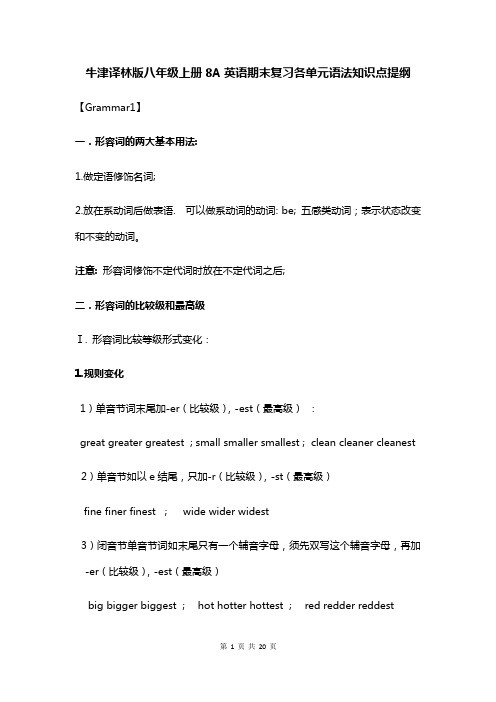
牛津译林版八年级上册8A英语期末复习各单元语法知识点提纲【Grammar1】一.形容词的两大基本用法:1.做定语修饰名词;2.放在系动词后做表语. 可以做系动词的动词: be; 五感类动词;表示状态改变和不变的动词。
注意:形容词修饰不定代词时放在不定代词之后;二.形容词的比较级和最高级Ⅰ. 形容词比较等级形式变化:1.规则变化1)单音节词末尾加-er(比较级),-est(最高级) :great greater greatest ; small smaller smallest ; clean cleaner cleanest 2)单音节如以e结尾,只加-r(比较级),-st(最高级)fine finer finest ; wide wider widest3)闭音节单音节词如末尾只有一个辅音字母,须先双写这个辅音字母,再加-er(比较级),-est(最高级)big bigger biggest ; hot hotter hottest ; red redder reddest4)以辅音字母+y结尾的词,则变y为-i,再加-er和-est。
easy easier easiest ; busy busier busiest5)部分双音节和多音节词在前面加单词more和most。
Careful more careful most carefulDifficult more difficult most difficult2.不规则变化good/well better best bad/ill worse worstmany/much more most little less leastfar farther/further farthest/furthest注:有些形容词一般没有比较等级。
如: right, wrong等。
三. 形容词比较级的用法:表示两者(人或物)的比较。
⒈表达“A大于B”用 A …比较级+than B①. Tom比我胖。
【同步练习】译林版初二英语上册 Unit8 Grammar 课时跟练

8A Unit8 Grammar 课时跟练(总分:45分 )一.根据词的适当形式填空(10分)1.While we________________(wait) for the bus, a girl ___________(run) up to us.2.I ___________________(telephone) a friend when Bob _______________(come) in.3.While we __________________(test) the new machine, the electricity(电) ____________(go)off.4.When Jane ___________________(put) up a picture, the door bell____________(ring).5.As he _____________(get) older, things seemed to get worse.6.We ______________________(have) a meeting from 7-9 yesterday morning.7.The little girl _____________________(read) a book when the bell rang.8.While we___________________(talk), the teacher came in.9._____________the Smiths ____________(have) dinner when you came in?10.I __________________(read) the newspaper then.二.单项选择(10分)()1.What_____your grandfather_____this time yesterday?A.is...doingB.was...doingC.did..doD.had...done( )2.____you______a meeting at four yesterday afternoon?A.Were...havingB.Was...havingC.Did...haveD.Do...have( )3.A:I called you at about half past eight last night,but nobody answered.B:Oh,I______in my office at that time.A.will workB.was workingC.workedD.had worked()4.His family_____TV from ten to twelve last night.A.watchedB.were watchingC.had watchedD.was watching()5.Li Lei______a letter to his friend last night.A.was writingB.was writtenC.will writeD.writes()6.A:Hi,Lin Tao.I didn’t see you at the party.B:Oh,I________ready for the maths exam.A.am gettingB.was gettingC.gotD.have got()7.A:I called you yesterday evening,but there was no answer.B:Oh,I am sorry I___________dinner at my friend’s home.A.have B.had C.was having D.have had()8.A:Did you notice him come in?B:No.I_____a football game.A.have watchedB.had watchedC.am watchingD.was watching()9.You must tell us what you_______at ten yesterday evening.A.didB.was doingC.were doneD.were doing()10.He asked_______outside.A.who are singingB.who was singingC.who singing wasD.who is singing三、补全对话. 在每个空白处填上一个适当的句子,使对话的意思连贯、完整。
牛津译林版七年级下册Unit 8《Pets》(Grammar)说课稿
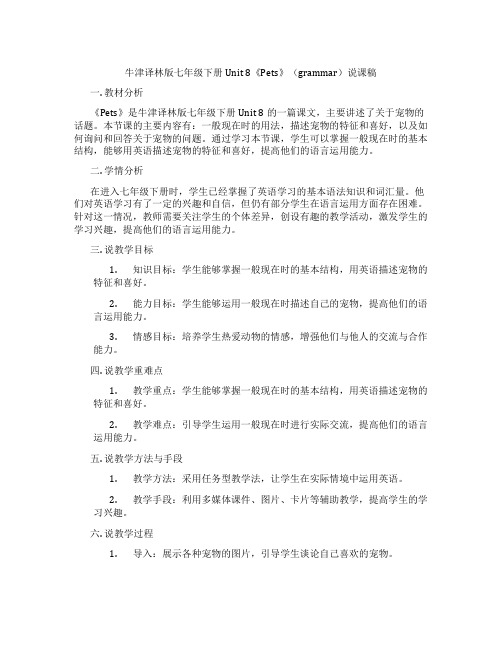
牛津译林版七年级下册Unit 8《Pets》(grammar)说课稿一. 教材分析《Pets》是牛津译林版七年级下册Unit 8的一篇课文,主要讲述了关于宠物的话题。
本节课的主要内容有:一般现在时的用法,描述宠物的特征和喜好,以及如何询问和回答关于宠物的问题。
通过学习本节课,学生可以掌握一般现在时的基本结构,能够用英语描述宠物的特征和喜好,提高他们的语言运用能力。
二. 学情分析在进入七年级下册时,学生已经掌握了英语学习的基本语法知识和词汇量。
他们对英语学习有了一定的兴趣和自信,但仍有部分学生在语言运用方面存在困难。
针对这一情况,教师需要关注学生的个体差异,创设有趣的教学活动,激发学生的学习兴趣,提高他们的语言运用能力。
三. 说教学目标1.知识目标:学生能够掌握一般现在时的基本结构,用英语描述宠物的特征和喜好。
2.能力目标:学生能够运用一般现在时描述自己的宠物,提高他们的语言运用能力。
3.情感目标:培养学生热爱动物的情感,增强他们与他人的交流与合作能力。
四. 说教学重难点1.教学重点:学生能够掌握一般现在时的基本结构,用英语描述宠物的特征和喜好。
2.教学难点:引导学生运用一般现在时进行实际交流,提高他们的语言运用能力。
五. 说教学方法与手段1.教学方法:采用任务型教学法,让学生在实际情境中运用英语。
2.教学手段:利用多媒体课件、图片、卡片等辅助教学,提高学生的学习兴趣。
六. 说教学过程1.导入:展示各种宠物的图片,引导学生谈论自己喜欢的宠物。
2.新课呈现:通过课件展示一般现在时的基本结构,讲解一般现在时的用法。
3.实践环节:学生分角色扮演,用一般现在时描述自己的宠物。
4.小组活动:学生分组讨论,分享彼此喜欢的宠物,并用英语描述宠物的特征和喜好。
5.总结提升:教师引导学生总结本节课所学内容,鼓励他们运用一般现在时进行实际交流。
七. 说板书设计板书设计如下:一般现在时:•主语 + 动词原形•主语 + 动词三单形式宠物特征和喜好:八. 说教学评价1.课堂参与度:观察学生在课堂上的积极参与程度,了解他们的学习状态。
Unit 8 第3课时 Grammar(被动语态)八年级英语下册(牛津译林版)

情态动词被动语态
Shoes can be recycled. Clothes should be recycled.
subject
modal verb
be
Past participle
can/ should/ must
be
动词过去分词规则 变化或不规则变化
一般将来时被动语态:肯定句
The 19th Asian Games will be held in Hangzhou in September, 2023.
被动语态的分类
一般现在时 一般过去时 一般将来时 情态动词 主动表被动
无被动
is/am/are + done was/were + done will/be going to be + done can/should/must + done 感官动词/使役动词 take place/ happen
PWahrilte- Two
Will a new hospital
be built next year.
Will
subject
be done
adverbial
一般疑问句,只需要把 will移放肯定句句首
动词过去分词规则变 化或不规则变化
一般将来时被动语态:特殊疑问句
When will the 19th Asian Games be held?
in China. 11.Your pen __w_r_i_te_s__ (write) so well. Where did you buy it? 12.It’s known that glass ___fe_e_l_s___ (feel) much colder than wood in winter.
牛津译林英语8A Unit8 Grammar 专项讲解和练习(含答案)
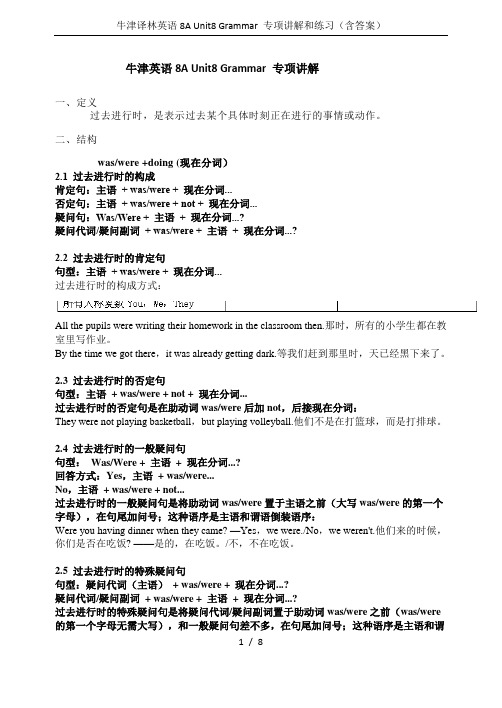
牛津英语8A Unit8 Grammar 专项讲解一、定义过去进行时,是表示过去某个具体时刻正在进行的事情或动作。
二、结构was/were +doing (现在分词)2.1 过去进行时的构成肯定句:主语+ was/were + 现在分词...否定句:主语+ was/were + not + 现在分词...疑问句:Was/Were + 主语+ 现在分词...?疑问代词/疑问副词+ was/were + 主语+ 现在分词...?2.2 过去进行时的肯定句句型:主语+ was/were + 现在分词...过去进行时的构成方式:All the pupils were writing their homework in the classroom then.那时,所有的小学生都在教室里写作业。
By the time we got there,it was already getting dark.等我们赶到那里时,天已经黑下来了。
2.3 过去进行时的否定句句型:主语+ was/were + not + 现在分词...过去进行时的否定句是在助动词was/were后加not,后接现在分词:They were not playing basketball,but playing volleyball.他们不是在打篮球,而是打排球。
2.4 过去进行时的一般疑问句句型:Was/Were + 主语+ 现在分词...?回答方式:Yes,主语+ was/were...No,主语+ was/were + not...过去进行时的一般疑问句是将助动词was/were置于主语之前(大写was/were的第一个字母),在句尾加问号;这种语序是主语和谓语倒装语序:Were you having dinner when they came? —Yes,we were./No,we weren't.他们来的时候,你们是否在吃饭? ——是的,在吃饭。
牛津译林版英语八上Unit 8《Natural》(Grammar)ppt课件
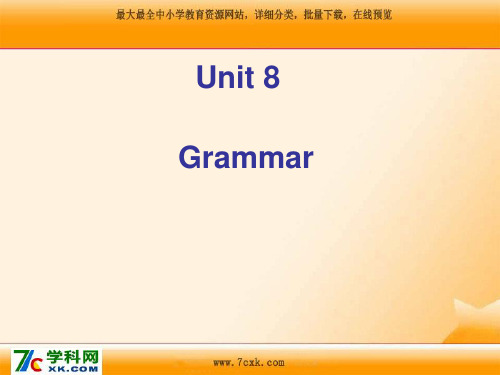
making mistakes.
过去进行时的句型结构
例句:He was playing basketball at this time yesterday.
主语was doing
其他成分
①肯定句的句型结构 : 主语 + was / were + doing +其他成分.
What are they doing now ? They are running now .
What were you doing at that moment?
I was cleaning the house.
What was the boy doing at that moment? He was swimming.
hold(容纳)等; ⑤ 短暂性动词:decide,stop等。
was reading Were doing was having
was walking waiting
was ringing
Were
6.when、while和as 1)都有“当……时候”之意,但“while”连 接的从句只能是延续性动词的进行时态。即
肯定回答: Yes , … was/were .否定回答: No ,… wasn’t / weren’t.
过去进行时的句式 (1)基本结构:was/were + v-ing (2)否定式: was/were not + v-ing
was not = wasn’t were not = weren’t (3)疑问句: 将 was/were 调到主语前
5.过去进行时与一般过去时的区别 1. 过去进行时着重描述当时正在进行
2017-2018学年牛津译林版初中英语8A Unit8 speak up and study skills教案

3.Go and see the doctor.
【当堂检测】
We should follow traffic _____ (规则).
2. There is a _______ (铁路) station in Yancheng.
He is making p_______ at home.
When you get hurt, what should you do first? Millie and Daniel are talking about first aid. Listen to their conversation and answer the following questions.
4. What should we do when we b___ ourselves.
5. Does he usually do h________ at home?
学生活动指导:
1.自由读,独立思考。
2.讨论,得出答案。
学生活动指导:
1.小组合作,做对话。
2.组内展示。
3.正确的可为小组加2分。
第三次备课(反思)
得:通过本节课的学习,学生能掌握一些急救方式,并能做新的对话,一些后进生在小组合作中也得到了提升。
失:一些学生对话做的不好,所犯错误较多。
改:课后老师多关注后进生。
2017-2018学年牛津译林版初中英语8A Unit8
电子备课格式(最新)
课题
8A unit8 speak up and study skills
主备
赵玉宇
主核
王颖
使用者
武传虎
2018秋译林版八年级英语上册教学课件:Unit 8 Grammar 1(共37张PPT)

Task 5
过去进行时与一般过去时的区别(1)
1. 过去进行时着重描述当时正在进行的动作,它的特点是:未完成,强调过 程;
2. 一般过去时表示一个已经完成的动作,表示动作发生过,而且已经结束了, 强调结果。
1. Mary __________ a dress when she cut her finger.
A. made
B. is making
C. was making D. makes
was making表示正在做衣服的过程,如用made则表示这一动作 已结束,做衣服的动作已结束与cut her finger就没有联系。
2. He __w_r_o_t(ewrite) a letter,then went to bed.
④ 表示所属关系的动词: belong,have,own,hold(容纳) 等。
堂清知识
We use the past continuous tense to talk about things that were happening at a particular time in the past.
过去进行时与一般过去时的区别(2)
1过去进行时侧重表示动作的延续; 2一般过去时表示过去某时发生过某事.
He _w__a_s_w_r_i_ti_n_gall night last night. (生动的描写,他一直写……) He _w__r_o_tesomething last night. (说明他写了……的事实)
2. He ---- the project (计划) with Jim at 8:00 last night. (discuss)
2017-2018学年牛津译林版初中英语八年级英语上册Unit8 Natural提高练习含答案
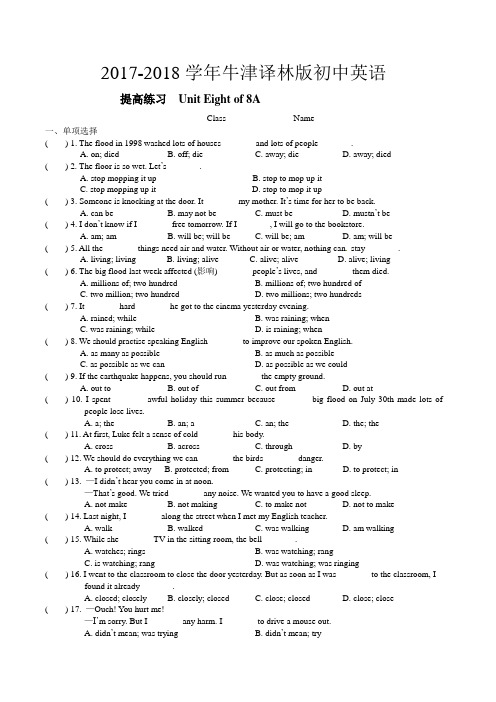
2017-2018学年牛津译林版初中英语提高练习Unit Eight of 8AClass _____________ Name _____________一、单项选择( ) 1. The flood in 1998 washed lots of houses _______ and lots of people _______.A. on; diedB. off; dieC. away; dieD. away; died( ) 2. The floor is so wet. Let’s _______.A. stop mopping it upB. stop to mop up itC. stop mopping up itD. stop to mop it up( ) 3. Someone is knocking at the door. It _______ my mother. It’s time for her to be back.A. can beB. may not beC. must beD. mustn’t be( ) 4. I don’t know if I _______ free tomorrow. If I _______, I will go to the bookstore.A. am; amB. will be; will beC. will be; amD. am; will be( ) 5. All the _______ things need air and water. Without air or water, nothing can stay _______.A. living; livingB. living; aliveC. alive; aliveD. alive; living( ) 6. The big flood last week affected (影响) _______ people’s lives, and _______ them died.A. millions of; two hundredB. millions of; two hundred ofC. two million; two hundredD. two millions; two hundreds( ) 7. It _______ hard _______ he got to the cinema yesterday evening.A. rained; whileB. was raining; whenC. was raining; whileD. is raining; when( ) 8. We should practise speaking English _______ to improve our spoken English.A. as many as possibleB. as much as possibleC. as possible as we canD. as possible as we could( ) 9. If the earthquake happens, you should run _______ the empty ground.A. out toB. out ofC. out fromD. out at( ) 10. I spent _______ awful holiday this summer because _______ big flood on July 30th made lots of people lose lives.A. a; theB. an; aC. an; theD. the; the( ) 11. At first, Luke felt a sense of cold _______ his body.A. crossB. acrossC. throughD. by( ) 12. We should do everything we can _______ the birds _______ danger.A. to protect; awayB. protected; fromC. protecting; inD. to protect; in( ) 13. —I didn’t hear you come in at noon.—That’s good. We tried _______ any noise. We wanted you to have a good sleep.A. not makeB. not makingC. to make notD. not to make( ) 14. Last night, I _______ along the street when I met my English teacher.A. walkB. walkedC. was walkingD. am walking( ) 15. While she _______ TV in the sitting room, the bell _______.A. watches; ringsB. was watching; rangC. is watching; rangD. was watching; was ringing( ) 16. I went to the classroom to close the door yesterday. But as soon as I was _______ to the classroom, I found it already _______.A. closed; closelyB. closely; closedC. close; closedD. close; close( ) 17. —Ouch! You hurt me!—I’m sorry. But I _______ any harm. I _______ to drive a mouse out.A. didn’t mean; was tryingB. didn’t mean; tryC. don’t mean; am tryingD. haven’t meant; tried( ) 18. He saw the bad man _______ into his neighbour’s house and _______ 110 for help in a hurry.A. to break; calledB. break; calledC. break; callD. breaking; calling( ) 19. He shouted _______ help, but no one came _______ a long time.A. to; toB. to; forC. for; toD. for; for( ) 20. —If you are in trouble, make sure to call the police. —_______A. I’m happy to hear that.B. I don’t know.C. I have to think about it.D. I will. Thanks a lot.二、完形填空The world is full of many interesting sounds. Some are unpleasant (讨厌) to our ears while 1 are very pleasant to hear. In daily life you may hear 2 sounds. All sounds are different. Some may be soft; others may be 3 . Some sounds are high, others are low.Some sounds are useful. 4 sound we can’t talk or listen to each other. The ringing of clock wakes people up. The hooting (鸣笛声) of a car warns people there may be 5 .Some sounds are 6 . When planes fly above the land, the very sounds can break the house down. Very loud sound can even make people deaf.We know sound travels about one kilometer in three 7 . In a thunder storm you see the lightning first and then hear the thunder. This is because light travels 8 than sound.Next time you see lightning, count the number 9 you hear the thunder.Divide (除) this number by 3. This will tell you 10 the thunder storm is.( ) 1. A. others B. the other C. another D. the others( ) 2. A. hundreds of B. hundred of C. hundreds D. hundred( ) 3. A. hard B. loud C. hardly D. loudly( ) 4. A. Of B. With C. Without D. Under( ) 5. A. safety B. car C. lights D. danger( ) 6. A. useful B. high C. dangerous D. wrong( ) 7. A. hours B. days C. minutes D. seconds( ) 8. A. more fast B. much faster C. more faster D. much fast( ) 9. A. after B. when C. before D. while( ) 10. A. how much B. how many C. how far D. how long三、阅读理解Babies love chocolate and sometimes they also eat the paper around it. My cat enjoys a meal of good, thick paper, old letters, for example. She doesn’t like newspapers very much.Of course, the best paper comes from wood. Wood comes from trees and trees are plants. Vegetables and fruit are plants too, and we eat a lot of them. So we can also eat wood and paper.Scientists say, “All food comes in some way from plants.” Well, is that true? Animals eat grass and grow fat, then we eat their meat. Little fish eat little seaplants, then bigger fish swim along and eat them. Chickens eat lots of grass and give us meat. Think for a minute. What food does not come from plants in some way?Scientists can do wonderful things with plants. They can make food just like meat and cheese. And they can make it without the help of animals. It is very good food, too. Now, they begin to say, “We make our paper from wood, and we can also make food from wood. The next thing is not very difficult.”What is the next thing? Maybe it is food from paper. Scientists say, “We can turn paper into food. It will be good, cheap food too, cheaper than meat or fish or eggs.”So please keep your old books and letters (Don’t feed them to your cat). One day, soon, they will be on your plate. There is nothing like a good story for breakfast.( ) 1. According to (按照) the writer, the best paper is made from _______.A. treesB. vegetablesC. woodD. grass( ) 2. According to the passage, which is the best title?A. Plants, Animals and Food.B. Food from Plants.C. Keep Your Books and Letters.D. What Can We Make with Old Paper?( ) 3. The writer asks us to keep our old books and letters because _______.A. there are always good stories in themB. we can make food from them soonC. we can read them at breakfastD. they may be used to feed cats( ) 4. The main idea of this passage is that _______.A. all food comes from plants in some wayB. scientists can make food with meat or eggsC. it will not be long before food can be made from paperD. scientists can do wonderful things with plants( ) 5. From the passage, we can infer (推断) that _______ don’t come from plants in some way.A. fish and chickensB. wood and paperC. meat and cheeseD. few kinds of food四、动词填空1. It is important for us to do something _______________ (stop) sandstorms.2. —Did you see a girl in red pass by just now?—No, sir. I _______________ (discuss) the new plan with my classmates.3. I heard someone _______________ (scream) for help while I was walking around the lake.4. The old man’s house caught fire because lightning _______________ (hit) it.5. _______________ he _______________ (make) a snowman when you saw him?6. He _______________ (mop) the floor for her mother at 4 p.m. yesterday.7. I’m sorry that I didn’t answer your phone. I _______________ (listen) to music and didn’t hear the ring.8. Sandstorms were getting more and more serious and _______________ (cause) a lot of problems.9. There _______________ (be) a strong sandstorm in the north of Beijing next Saturday, isn’t there?10. The house _______________ (shake) when the trains went by.五、阅读填空Lightning is one of the most beautiful natural phenomena (现象). It is also one of the most deadly phenomena. A bolt of lightning is six times hotter than the surface (表面) of the sun and gives out 30, 000 amps of electricity (电). It can travel at 100, 000 kilometers per hour and has the ability to hit a target up to 40 kilometers away. About 1,000 people around the world are killed by lightning every year.Only about ten percent of people struck (击中) by lightning will actually die, but the others are actually very badly injured (受伤), with burns, broken bones, blindness, deafness, paralysis, or memory loss. However, when the electricity passes through their brains (大脑), it can occasionally have unusual and even positive effects (积极作用). Some blind (瞎的) people have got their sight back after being struck by lightning. One woman said a psychological test showed her intelligence (智力) had greatly improved (提高) and one man said he could no longer feel cold at all and could go out in temperature below zero in just a T-shirt!So what should you do to stay safe in a thunderstorm? The most important rule is to stay inside, but do not go near phones, electrical appliances, plumbing or water. If you are struck outside, do not take shelter under a tree. Instead, roll (卷) yourself up into a ball on the ground as small as possible. And do not think it has to be raining in order for lightning to strike.Strangely, lightning seems to prefer (偏爱) some people to others. If you are a man, you are more likely to be struck by lightning than a woman!六、完成句子1. 一阵大风从后面袭来,我几乎跌倒。
- 1、下载文档前请自行甄别文档内容的完整性,平台不提供额外的编辑、内容补充、找答案等附加服务。
- 2、"仅部分预览"的文档,不可在线预览部分如存在完整性等问题,可反馈申请退款(可完整预览的文档不适用该条件!)。
- 3、如文档侵犯您的权益,请联系客服反馈,我们会尽快为您处理(人工客服工作时间:9:00-18:30)。
Communication show
Make sentences
1 2
at this time yesterday
3ቤተ መጻሕፍቲ ባይዱ
at 4 p.m. yesterday the whole night yesterday
Communication show
Make sentences 1. The boys were playing football at 4 p.m. yesterday. 2. The woman was shopping at this time yesterday. 3. The girl was reading the whole night yesterday.
It was raining/were raining yesterday.
They were doing/did homework from 4:00 to 5:00 that afternoon.
Discovering
Work out the rule!
Essential Structure
was / wasn’t sb + were / weren’t + doing
2
People were running in all directions while pieces of glass and bricks were falling down.
Lead-in
Lead-in
What were people doing when the earthquake happened?
Entrance examination link
Practice
3. Sally took a photo of her friends while they _____ computer games. (2013· 杭州市) A. play B. are playing C. have played D. were playing √ 4. —Has David finished his project yet? —I guess not. He _____ on it at lunchtime. Do you want to confirm it? (2014· 无锡市) A. is working B. was working √ C. has worked D. had worked
2017-2018学年牛津译林版 初中英语8A Unit 8
Unit 8 Natural disasters Grammar
Lead-in
1 3
I was sleeping when the earthquake started.
As I was trying to find my way out, I suddenly heard some noise above me.
Communication show
Complete a conversation
◆Complete Part A on Page 97
Practice
1. —Was Kate at the party last night? —Yes, she _____ a really nice dress. (2013· 盐城市) A. is wearing B. was wearing √ C. would wear D. has worn 2. Millie ____ a picture when Mr Green came in. (2013· 徐州市) A. draw B. will draw C. drew D. was drawing √
Discovering
Use the rule!
◇Circle the right verb.
At this time yesterday, she is reading/was reading in the study. What were you doing/did you do at nine o’clock last night? I am chatting/was chatting online with my friends when he came.
Lead-in
The past continuous tense
过去进行时
Discovering
What’s the rule?
◇Look at the sentences. He was watching TV at nine yesterday. We were sleeping when you came. She was cooking dinner at that time. They were playing football that afternoon. You were reading when the telephone rang. I was washing my car at this time yesterday.
Discovering
Work out the rule!
◆We use “was + doing” with the pronoun
_____, he _____, she _____ it and _____. I
◆We use “were + doing” with the pronoun
_____, you _____ they and _____. we
Explaining
Usage To talk about things that were happening at a particular time in the past.
e.g. I was reading a book at 5 p.m. yesterday. She wasn’t chatting online just now. Were your parents watching TV at 9 last night? What were they discussing all day last Sunday?
